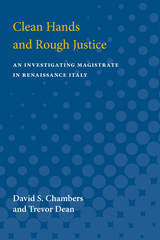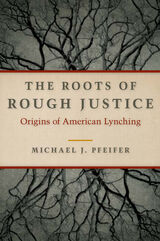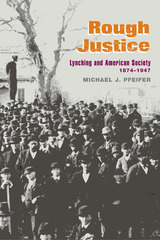3 books about Rough Justice

Clean Hands and Rough Justice
An Investigating Magistrate in Renaissance Italy
David S. Chambers and Trevor Dean
University of Michigan Press, 1997
It is rarely possible to write biographies of lay people who lived in the Middle Ages. While accounts of clerical, royal, and military life are many, the wider populace has remained in relative obscurity. In Clean Hands and Rough Justice: An Investigating Magistrate in Renaissance Italy, David S. Chambers and Trevor Dean present an extraordinary and previously unknown character from Renaissance Italy, Beltramino Cusadri (ca. 1425–1500). This judge was known as the "terrible commissioner," and he spent most of his professional life acting as criminal investigator and legal adviser to two princely dynasties—the Gonzaga of Mantua and the Este of Ferrara. The authors investigate and compare the judicial institutions and social conditions in which he worked, the criminal cases that he investigated, and his successes and failures. Their combined presentation of the figure and mentality of Beltramino amounts to something unprecedented in Italian Renaissance historiography: the portrait of a professional man, employed to combat rising crime but accused of corruption and tyranny by the entrenched interests that he faced. The book follows the major phases of Beltramino's career along with a broader exploration of the legal history of Renaissance Italy. In his long life Beltramino Cusadri wrote hundreds of letters to his employers, and it is upon these letters that this book is based. These letters, with their wry, colorfully worded expressions, are liberally quoted and provide unique insight into the career, activity, and attitudes of a major Renaissance bureaucrat. The letters of his employers in return, and of many other judges and officials, along with the evidence of legislation and prosecution, are also drawn upon to examine a variety of themes, from the progress of lawmaking and the pattern of criminality, to the problems of policing and the changing forms of punishment. These provide an extraordinarily vivid picture of face-to-face realities that make an important cont
[more]

The Roots of Rough Justice
Origins of American Lynching
Michael J. Pfeifer
University of Illinois Press, 2014
In this deeply researched prequel to his 2006 study Rough Justice: Lynching and American Society, 1874–1947, Michael J. Pfeifer analyzes the foundations of lynching in American social history. Scrutinizing the vigilante movements and lynching violence that occurred in the middle decades of the nineteenth century on the Southern, Midwestern, and far Western frontiers, The Roots of Rough Justice: Origins of American Lynching offers new insights into collective violence in the pre-Civil War era.
Pfeifer examines the antecedents of American lynching in an early modern Anglo-European folk and legal heritage. He addresses the transformation of ideas and practices of social ordering, law, and collective violence in the American colonies, the early American Republic, and especially the decades before and immediately after the American Civil War. His trenchant and concise analysis anchors the first book to consider the crucial emergence of the practice of lynching of slaves in antebellum America. Pfeifer also leads the way in analyzing the history of American lynching in a global context, from the early modern British Atlantic to the legal status of collective violence in contemporary Latin America and sub-Saharan Africa.
Seamlessly melding source material with apt historical examples, The Roots of Rough Justice tackles the emergence of not only the rhetoric surrounding lynching, but its practice and ideology. Arguing that the origins of lynching cannot be restricted to any particular region, Pfeifer shows how the national and transatlantic context is essential for understanding how whites used mob violence to enforce the racial and class hierarchies across the United States.
[more]

Rough Justice
Lynching and American Society, 1874-1947
Michael J. Pfeifer
University of Illinois Press, 2004
READERS
Browse our collection.
PUBLISHERS
See BiblioVault's publisher services.
STUDENT SERVICES
Files for college accessibility offices.
UChicago Accessibility Resources
home | accessibility | search | about | contact us
BiblioVault ® 2001 - 2024
The University of Chicago Press









